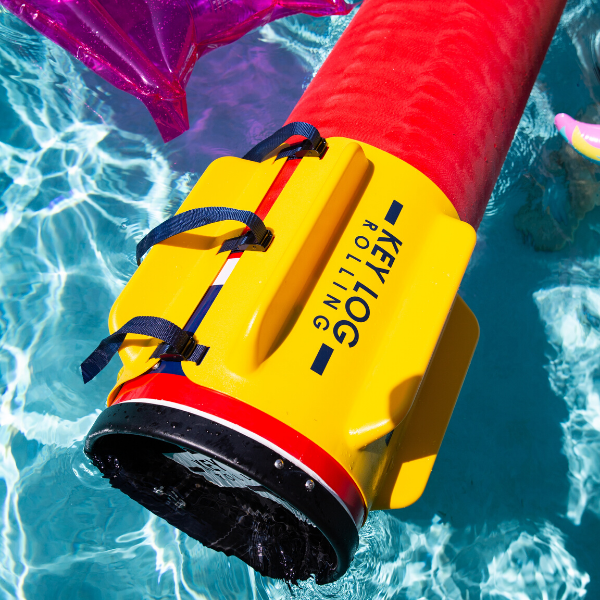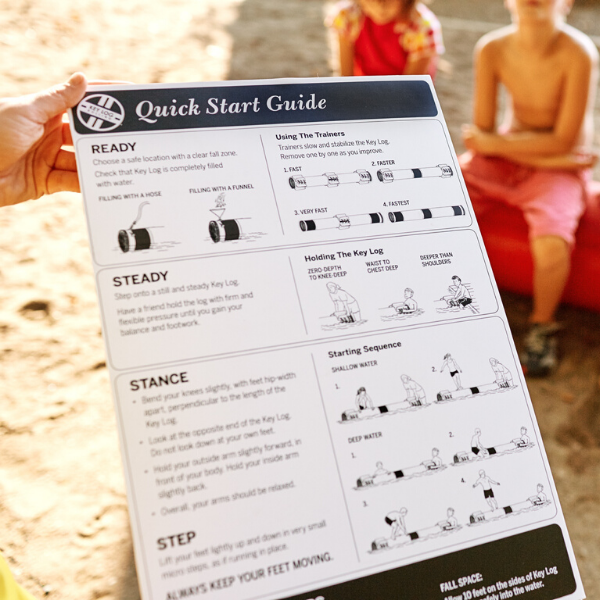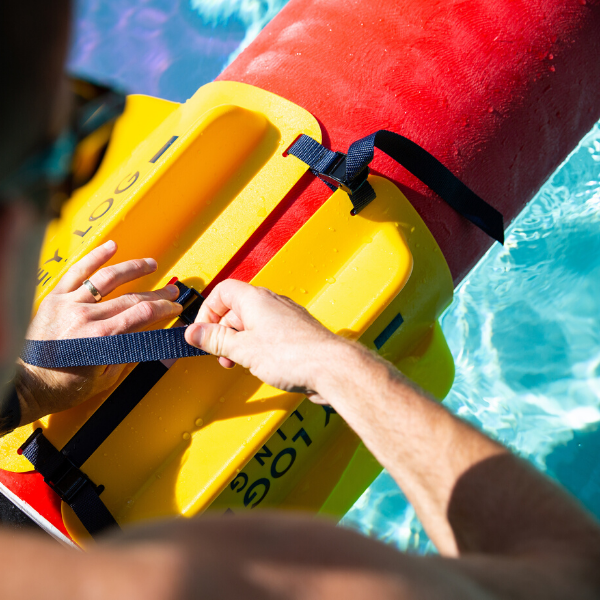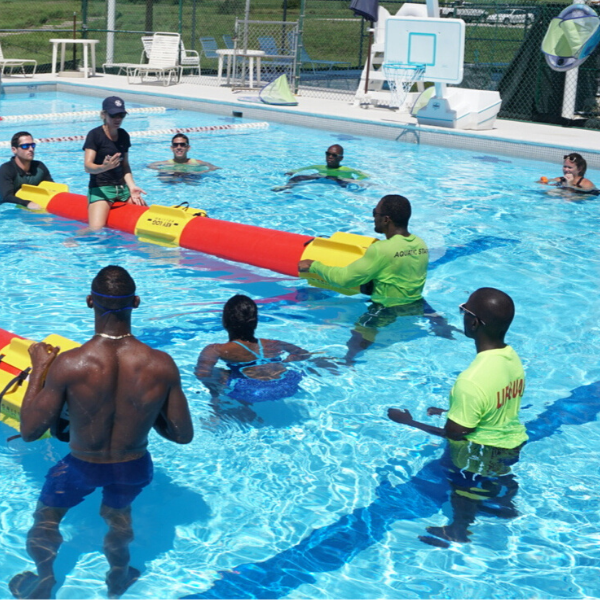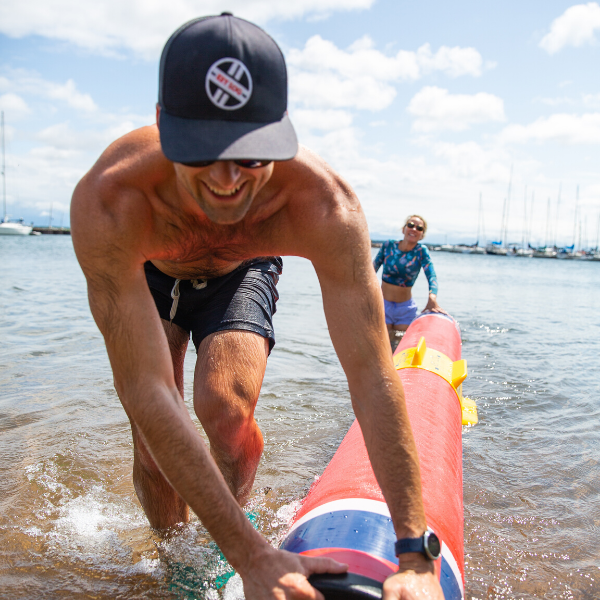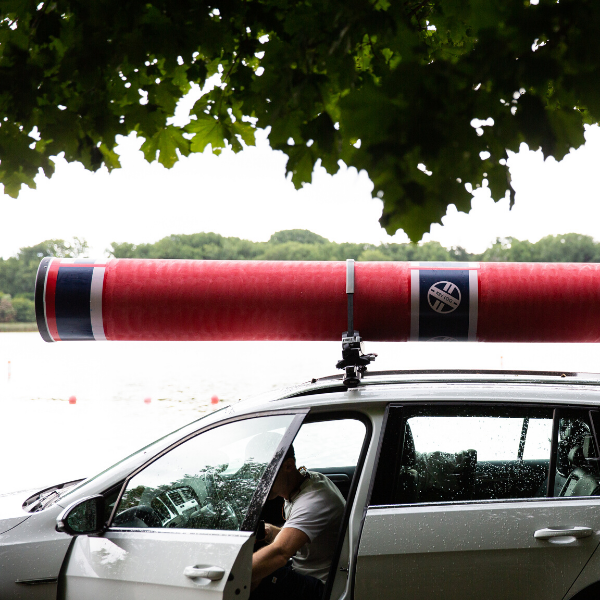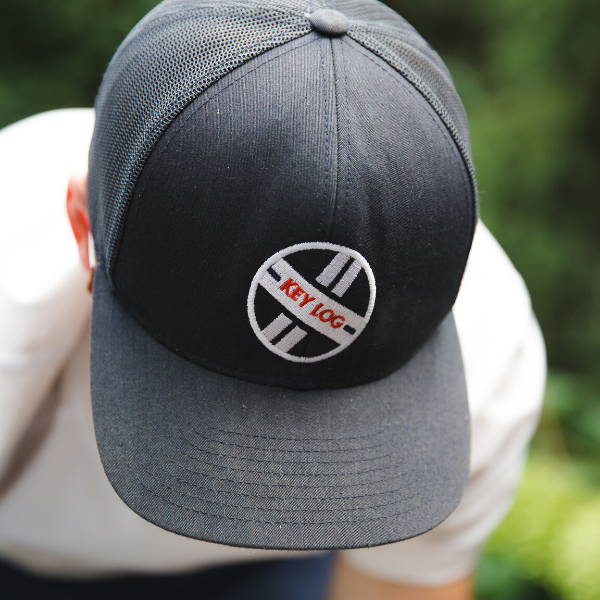Watching 12 year-old Christina at log rolling practice before our interview, I saw a quietly happy and sporty looking girl with long blonde braids and freckly, sun kissed skin; she looks like the picture of robust childhood health.
When I sat down to interview her family at the beach she didn't stop log rolling until her mom called her over. She stayed out of the water just long enough to give thoughtful answers to my questions before running back to to hop on the Key Log.
Christina and her family credit log rolling with helping Christina overcome her symptoms of dyspraxia or Developmental Coordination Disorder (DCD), and related vision problems that accompany the disorder. Here's what we found out:
Childhood Struggles with Coordination and Vision
Since toddlerhood, Christina has had many vision problems and diagnoses. As a young child, she was diagnosed with amblyopia (or lazy eye) in both eyes. The doctor described Christina's vision as, "so blurry it is possible her brain was accepting blurry images as normal."
To combat her visual processing challenges, she began intense visual therapies. The goal of her therapies was to develop her vision with glasses so that she would one day be able to drive a car.
Meanwhile, in grade school, despite working very hard, Christina was struggling. She had anxiety, learning and memory difficulties, as well as large motor and coordination problems.
When Christina was in 4th grade, she was formally diagnosed with dyspraxia or developmental coordination disorder. Dyspraxia is a brain or neurological disorder and is a "chronic disability that affects coordination". Dyspraxia is classified as a sensory-based motor disorder and commonly presents concurrently with visual perception problems like the ones Christina was already being treated for, but for which she still struggled.
There are no known cures for dyspraxia but there are therapeutic interventions called Sensory Integration Therapies which have been shown to help children with dyspraxia overcome their symptoms.
One of the few specific therapies that has been scientifically shown to help dyspraxic kids is Equine Therapy or Therapeutic Horse Riding. In fact, Christina's doctor strongly recommended that she begin a regimen of English horseback riding. However, Christina and her family live in an urban neighborhood without practical access to horses, so Christina was treated with more traditional physical and occupational therapies that involved various kinds of perceptual motor training.
Discovery of Log Rolling
Looking for something different to try during the summer break from school, Christina's mom signed Christina and her sister up for a week-long day camp at a local JCC (Jewish Community Center) near her St. Louis Park home. There, they learned the basics of log rolling including the fun and exhilaration of climbing up, taking a fun steps, falling into the water and doing it all over again. Success comes quickly in log rolling, creating a drive to do it again, trying to stay up just one second longer.
The following summer, Christina and her sister participated in the St. Louis Park Community-Ed Log Rolling program. They immediately loved the red Key Logs used in the program. "Key Logs didn't give me rug burn," Christina said.
Christina's first log rolling classes at the pool were kind of like "playing" on the Key Logs. The teacher and life guard even encouraged playful activities like shooting balls to poolside basketball hoops, while standing on the logs.
While Christina and her sister were having fun playing around with log rolling, their bodies were doing something amazing without them consciously knowing it. When a body is continually moving to stay on top of a spinning log, the brain has to keep track of where it is in space while floating in water. Add another activity into that mix, like throwing basketballs through hoops, creates a sort of proprioception sensory miracle.
Christina was constantly begging for log rolling and her mom started following Key Log Rolling® on Facebook where she could watch for log rolling opportunities in Minnesota. They discovered a free log rolling workshop at the Blaisdell YMCA in Minneapolis, hosted by members of the Minneapolis Log Rolling Club.
All-In on Log Rolling
Soon, it was log rolling all the time for Christina and her sister. They joined the Minneapolis Log Rolling Club and started log rolling with the club a few times a week. For her birthday, Christina's parents rented space in a local pool with a Key Log, and hired a lifeguard so she could log roll by herself non-stop for an hour. "It was the best birthday present ever!" said Christina.
Christina became so interested and engrossed in log rolling that she even chose to study the sport for a school project. She researched and presented the History of Log Rolling at a school history fair. We might be biased, but we think her project deserves an 'A'.

When asked what she likes best about log rolling, Christina answered "setting my own goals and then beating my own records."

Christina also loves log rolling tournaments where she hangs out with her log rolling friends. And she loves the happy, motivated feeling she gets from competing.
Log Rolling as Therapy
Christina has been log rolling several times a week for the past two years, and her skills have improved tremendously. But more importantly, since she began rolling, her coordination, balance, focus and vision have improved to the point that she no longer requires a vision specialist. And the characteristics that gave rise to her dyspraxia diagnosis are no longer on display. "Once she started log rolling, a lot of things fell into place," said Sheila (Christina's mom).
Although the benefits for Christina have been real, we can't say with scientific certainty that log rolling is the cause of her improvement. Research will need to be done to show that. But one thing is for certain; log rolling provides a rich sensorial experience, one that has similarities to Equine Therapy. Both activities are done on moving objects and both require immense focus and visual concentration. Both require proprioceptive and spatial awareness skills — skills that are key to developing sensory strength. Furthermore, both Equine Therapy and Log Rolling activate and engage core muscles, strength and balance. Log rolling has the added that it is easily accessible to community and recreation programs, in pools, ponds, or lakes.
Log rolling is fun and provides fitness benefits for most kids who try it, but we have a hunch that the benefits could be especially helpful to kids with sensory processing disorders and/or weak core strength. Besides Dyspraxia and DCD, people with Autism Spectrum Disorder (ASD), and Attention Deficit Disorder (ADD), could see significant benefit from log rolling. A lot has been written about the detrimental effect of weak core muscles with these disorders, including the relationship between core strength and childhood development. But there has been no published scientific research documenting the benefits of log rolling for kids with sensory processing disorders or conditions associated with weak core strength like ASD and ADD.
If you are interested in researching log rolling and potential benefits for various disorders, please get in touch with us at info@keylogrolling.com
If you are interested in learning to log roll, check this map of Key Log Rolling programs!
Blog submitted by Julie Colby, Director of Operations
Further Related Reading:
- Therapeutic Horse Riding Study
- Sensory integration and ASD study
- Sensory integration and DCD by NCBI study
- Harvard study on core strength
- Scientific study about exercise and perceptual visual exercise
- Relationship between core strength and balance paper
- The Connection between Exercise and autism paper
- Relationship between Core Strength and developmental benefit

